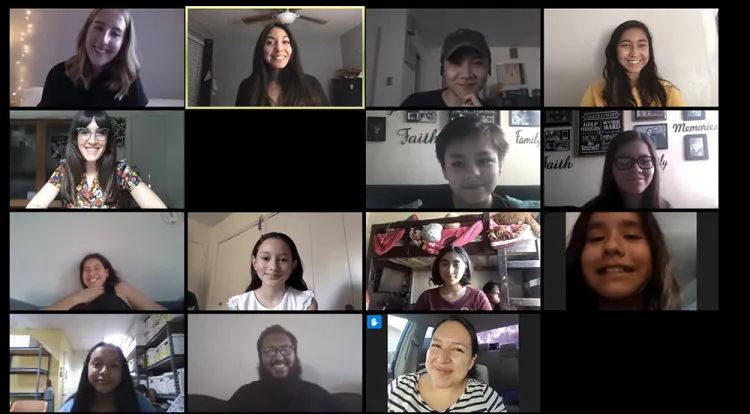The Front Lines of Change: Helping Low-Income Students Translate Their Experiences

From left: Rebecca Castillo ’20, Ariana Hoshino ’20, and Isabelle Titcomb ’22 are using Storyboard to help 30 seventh-graders in underserved areas of New York and Los Angeles turn their life experiences into film and photo essays.
For many Swarthmore students, the summer of 2020 has been a time of activism and agency as they organize, overcoming COVID-19 limitations, and work to make positive change in their communities through a variety of initiatives. This is the second in a series of stories about their effort and success in engagement for social justice.
Previous entry: The Front Lines of Change: Making the Black Experience Visible
Since 2018, Storyboard has hosted an innovative summer program that teaches youths to turn their life experiences into film and photo essays. Due to the pandemic, that process shifted to a remote experience in 2020, but the art that participants created may just be more significant than ever.
Ariana Hoshino ’20, Rebecca Castillo ’20, and Tiye Pulley ’19 founded the project in 2017 on a Project Pericles grant from Swarthmore. This summer, the program — led by the team of Castillo, Hoshino, and Isabelle Titcomb ’22, who also pitched Storyboard during the SwatTank final this spring — included 30 seventh-graders in underserved areas of New York and Los Angeles.
The students spent about six hours per week learning basic photography, filmmaking, and writing skills and working on two projects, a photo essay and short film documentary. Students primarily used cameras they have at home, such as smartphones, but program sponsors sent tripods to every student, and laptops, cameras, and iPhones to students who didn’t have them. They worked with volunteer mentors, including seven Swarthmore students, and an instructor, whose position is funded by the Center for Innovation and Leadership (CIL).
At their first meeting, students were eager to address their experiences with several of this year's unprecedented events.
“Some of those subjects that kids were bringing up included COVID, vaccination, Black Lives Matter, and the protests that are going on, or they wanted to talk about someone close to them that they can’t see because of the pandemic,” says volunteer mentor Bria Dinkins ’21, a sociology & anthropology major from West Chester, Pa.
On Aug. 2, Storyboard LA showcased the finished work of their students — seventh-graders from the historically Mexican American immigrant neighborhood of Boyle Heights — in an online event for family and friends. In several of the documentaries, students filmed and translated Spanish-language interviews about immigration with parents, siblings, and relatives.
In one, a mother talks about her experience crossing the border in 1999 to find better medical care for her brother. She and her sister reached a mountain that was too slippery to climb and would not have made it if a man hadn’t noticed and pulled them up.
She also discusses the difficulties of the language barrier, her constant worries about deportation, and her hope that the immigration system will improve. “You never think you would come here and start from zero,” she says about those who had professions in Mexico.

On Aug. 2, Storyboard LA showcased the finished work of their students — seventh-graders from the historically Mexican American immigrant neighborhood of Boyle Heights — in an online event for family and friends.
Other films featured the COVID-19 pandemic. One student’s mother, working as a cashier, talks about her fear at the onset of the lockdown. “When the government forced mandatory closure,” she says, “my husband and I were scared we weren’t going to have enough money for our kids.” Her young son says he doesn’t always enjoy being home, but when his parents are there, he’s happy. The family friend of another student lost his job with an events company when large gatherings were banned, but now sells objects with printed designs.
The films tackled other topics, as well. One student explored the practice of “guerrilla gardening,” a term coined by urban community gardener Ron Finley. Another interviewed her sister about playing as a high school football quarterback.
Atziri Marquez ’22, a psychology major from Los Angeles, signed up to work remotely as a volunteer mentor for Storyboard in April, while the direction of the pandemic was still unclear. For her, art has been a grounding influence during the nationwide lockdown, and she hopes it will act in the same way for her students.
“At the conclusion of this program, we’ll leave them with something that they created,” she says. “That’s really powerful, at a time where most of what is going on just seems out of our control and beyond our power.”
While the remote format had its challenges, the circumstances of this summer also provided students with a unique opportunity, says volunteer Nara Enkhtaivan ’22, an educational studies major from Ulaanbaatar, Mongolia.
“In the media, children’s voices really are not heard that much, so especially during this time, we don’t know what 12-year-olds or middle schoolers are really going through,” she says. “Giving them the tools and the opportunity to be creative and tell their stories and their experiences … it’s very important for us and for the older generations, too.”



